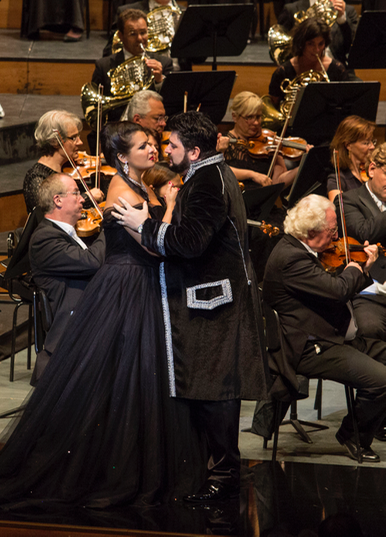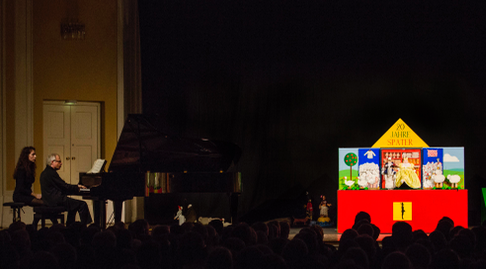
18 Aug 2016
Salzburg encores
A staged piano recital and an opera as a concert. Pianist András Schiff accompanied the Salzburg Marionette Theater at the Mozarteum Grosser Saal and Anna Netrebko sang Manon Lescaut at the Grosses Festspielhaus.
English Touring Opera are delighted to announce a season of lyric monodramas to tour nationally from October to December. The season features music for solo singer and piano by Argento, Britten, Tippett and Shostakovich with a bold and inventive approach to making opera during social distancing.
This tenth of ten Live from London concerts was in fact a recorded live performance from California. It was no less enjoyable for that, and it was also uplifting to learn that this wasn’t in fact the ‘last’ LfL event that we will be able to enjoy, courtesy of VOCES8 and their fellow vocal ensembles (more below …).
Ever since Wigmore Hall announced their superb series of autumn concerts, all streamed live and available free of charge, I’d been looking forward to this song recital by Ian Bostridge and Imogen Cooper.
The Sixteen continues its exploration of Henry Purcell’s Welcome Songs for Charles II. As with Robert King’s pioneering Purcell series begun over thirty years ago for Hyperion, Harry Christophers is recording two Welcome Songs per disc.
Although Stile Antico’s programme article for their Live from London recital introduced their selection from the many treasures of the English Renaissance in the context of the theological debates and upheavals of the Tudor and Elizabethan years, their performance was more evocative of private chamber music than of public liturgy.
In February this year, Albanian soprano Ermonela Jaho made a highly lauded debut recital at Wigmore Hall - a concert which both celebrated Opera Rara’s 50th anniversary and honoured the career of the Italian soprano Rosina Storchio (1872-1945), the star of verismo who created the title roles in Leoncavallo’s La bohème and Zazà, Mascagni’s Lodoletta and Puccini’s Madama Butterfly.
Evidently, face masks don’t stifle appreciative “Bravo!”s. And, reducing audience numbers doesn’t lower the volume of such acclamations. For, the audience at Wigmore Hall gave soprano Elizabeth Llewellyn and pianist Simon Lepper a greatly deserved warm reception and hearty response following this lunchtime recital of late-Romantic song.
Collapsology. Or, perhaps we should use the French word ‘Collapsologie’ because this is a transdisciplinary idea pretty much advocated by a series of French theorists - and apparently, mostly French theorists. It in essence focuses on the imminent collapse of modern society and all its layers - a series of escalating crises on a global scale: environmental, economic, geopolitical, governmental; the list is extensive.
For this week’s Live from London vocal recital we moved from the home of VOCES8, St Anne and St Agnes in the City of London, to Kings Place, where The Sixteen - who have been associate artists at the venue for some time - presented a programme of music and words bound together by the theme of ‘reflection’.
'Such is your divine Disposation that both you excellently understand, and royally entertaine the Exercise of Musicke.’
Amongst an avalanche of new Mahler recordings appearing at the moment (Das Lied von der Erde seems to be the most favoured, with three) this 1991 Mahler Second from the 2nd Kassel MahlerFest is one of the more interesting releases.
‘And there was war in heaven: Michael and his angels fought against the dragon; and the dragon fought and his angels, And prevailed not; neither was their place found any more in heaven … that old serpent … Satan, which deceiveth the whole world: he was cast out into the earth, and his angels were cast out with him.’
If there is one myth, it seems believed by some people today, that probably needs shattering it is that post-war recordings or performances of Wagner operas were always of exceptional quality. This 1949 Hamburg Tristan und Isolde is one of those recordings - though quite who is to blame for its many problems takes quite some unearthing.
There was never any doubt that the fifth of the twelve Met Stars Live in Concert broadcasts was going to be a palpably intense and vivid event, as well as a musically stunning and theatrically enervating experience.
‘Love’ was the theme for this Live from London performance by Apollo5. Given the complexity and diversity of that human emotion, and Apollo5’s reputation for versatility and diverse repertoire, ranging from Renaissance choral music to jazz, from contemporary classical works to popular song, it was no surprise that their programme spanned 500 years and several musical styles.
The Academy of St Martin in the Fields have titled their autumn series of eight concerts - which are taking place at 5pm and 7.30pm on two Saturdays each month at their home venue in Trafalgar Square, and being filmed for streaming the following Thursday - ‘re:connect’.
The London Symphony Orchestra opened their Autumn 2020 season with a homage to Oliver Knussen, who died at the age of 66 in July 2018. The programme traced a national musical lineage through the twentieth century, from Britten to Knussen, on to Mark-Anthony Turnage, and entwining the LSO and Rattle too.
With the Live from London digital vocal festival entering the second half of the series, the festival’s host, VOCES8, returned to their home at St Annes and St Agnes in the City of London to present a sequence of ‘Choral Dances’ - vocal music inspired by dance, embracing diverse genres from the Renaissance madrigal to swing jazz.
Just a few unison string wriggles from the opening of Mozart’s overture to Le nozze di Figaro are enough to make any opera-lover perch on the edge of their seat, in excited anticipation of the drama in music to come, so there could be no other curtain-raiser for this Gala Concert at the Royal Opera House, the latest instalment from ‘their House’ to ‘our houses’.
"Before the ending of the day, creator of all things, we pray that, with your accustomed mercy, you may watch over us."

A staged piano recital and an opera as a concert. Pianist András Schiff accompanied the Salzburg Marionette Theater at the Mozarteum Grosser Saal and Anna Netrebko sang Manon Lescaut at the Grosses Festspielhaus.
Opera in concert is a tradition at the Salzburg Festival. The format of such endeavors is however puzzling, at least based on the concert performances (three) of Manon Lescaut in early August. Basic expectations of such events might assume that musical values would be paramount since there would not be the distraction of staging. This was not the case of this Manon Lescaut.
Instead it was a showcase for Anna Netrebko, and that alone of course validates the programming. However such a centerpiece could surely give incentive to the festival to build a cast around such vocal splendor that might strive toward some degree of high, finished art.
The assembled cast included Algerian born, Moscow trained, Franco-Corelli-finished tenor Yusif Eyvazov as Des Grieux (who happens to be Mme. Netrebko’s husband), and Mexican baritone Armando Piña as Manon’s brother Lescaut. Piña, a fine young singer, is a Resident Artist, i.e. student at Philadelphia’s prestigious finishing school for opera singers, the Academy of Vocal Arts. Geronte was sung by 66 year-old bass-baritone Carlos Chausson who has made a distinguished career singing the repertory’s well-known buffo roles.
Rather than the singers sitting in chairs with music stands and scores while waiting their turn to sing the Salzburg concert format elicits actual staging, if minimal. Singers entered and exited much as staging instruction in the score might tell them. Roles were acted, singers moved as if staged. It did not arrive at what the French call a mise en espace (there was no lighting or costumes) nor was it a concert.
The staging, probably improvised by the singers, was on the stage apron therefore the conductor, Marco Armiliato and the Munich Rundfunkorchester were behind the singers. Mo. Armiliato had no visual contact with the singers, nor did the singers ever communicate with him. Apparently at ease with standard Manon Lescaut routine this maestro never felt the need even to look over his shoulder.
Forty-five year old Anna Netrebko, in good physical and perfect vocal shape, appeared in a huge black gown discretely studded with black sequins, i.e. concert dress that made her entrances and a few hurried exits cumbersome indeed. Mr. Eyvazov wore some sort of ethnic coat of maybe Slavic, maybe Turkic inspiration that indeed set him apart, the balance of the performers wore formal concert dress.
Portraying a teenage girl was of course out of the question for Mme. Netrebko under the circumstances, and she did not really shine as an artist until Manon’s death. It was spellbinding. Though of course she was a star the entire evening and that is why we were there. Mr. Eyvazoy delivered the first act deploying the tenorial vocal and histrionic attitudes that are long out of fashion, the stuff of caricature. He rose valiantly and with a degree of artistic honesty to the occasion of Manon’s deportation — well rewarded by applause. Without proper costuming and wig Mr. Piña’s well coached singing disappeared into little more than a reading of the role to support the exploits of the tenor and soprano. In the midst of these two powerful, youthful male voices Mr. Chausson’s performance seemed small indeed. The only performance of the evening that seemed appropriate for what a Salzburg Festival concert opera might be was that of the Dance Master, fancily performed by young German tenor Patrick Vogel.
 András Schiff and page turner with set for Children's Corner puppet ballet
András Schiff and page turner with set for Children's Corner puppet ballet
Hungarian pianist András Schiff, one of the world’s established concert artists, slickly played Robert Schumann’s youthful Papillons (Op. 2) of about 16 minute duration, and then played Claude Debussy’s Children’s Corner, a suite of about 17 minutes duration that Debussy composed for a piano teaching method book. For this piece Mr. Schiff used the music. Both pieces are well within the reach of advanced piano students. Surely I am not alone in wishing Mr. Schiff’s program had been from the major, virtuoso repertory.
The piano was then pushed to one side exposing puppet show contraptions. Mr. Schiff returned to perform the same two pieces, accompanying a mise en scène for each, executed by four puppeteers operating a variety of puppets.
For the Schumann’s Papillons there were characters of the novel Flegeljahre (Adolescent Years) by a writer named “Jean-Paul,” this novel the inspiration for these 12 brief pieces. Essentially the well-organized Walt wins the girl, having competed with his impetuous brother Vult for her attentions. This mise en scène was imagined by puppeteer Thomas Reichert. It was premiered in 2014 in Calgary, Canada.
Debussy amplified his Children’s Corner suite for piano into a full-scale puppet ballet for children with orchestra, La Boite à joujoux. The ballet was recast in 2010 in Ittigen, Switzerland by puppeteer Hinrich Horstkotte to fit Debussy’s original Children’s Corner for piano. The characters are Pulcinella, Golliwog — a late nineteenth century black faced puppet, evidently not a politically incorrect issue in Austria — for Debussy’s famed Golliwog’s Cakewalk, and a Soldier, plus lots of mechanical intervention of the toy box set contraption and dramatic participation by the four, obviously accomplished, black dressed puppeteers.
The evening was appreciated by the audience who apparently did not care that it was gratuitous use of the talents of Andràs Schiff.
Michael Milenski